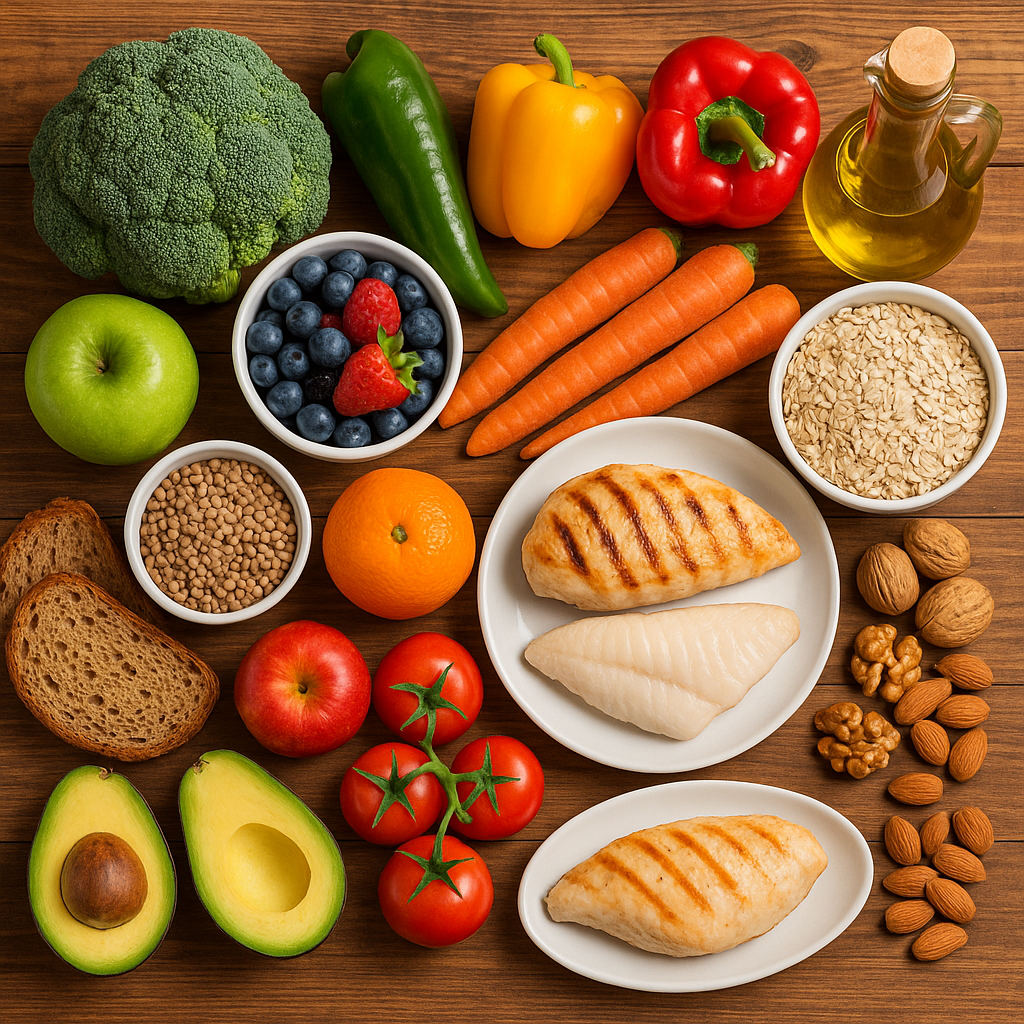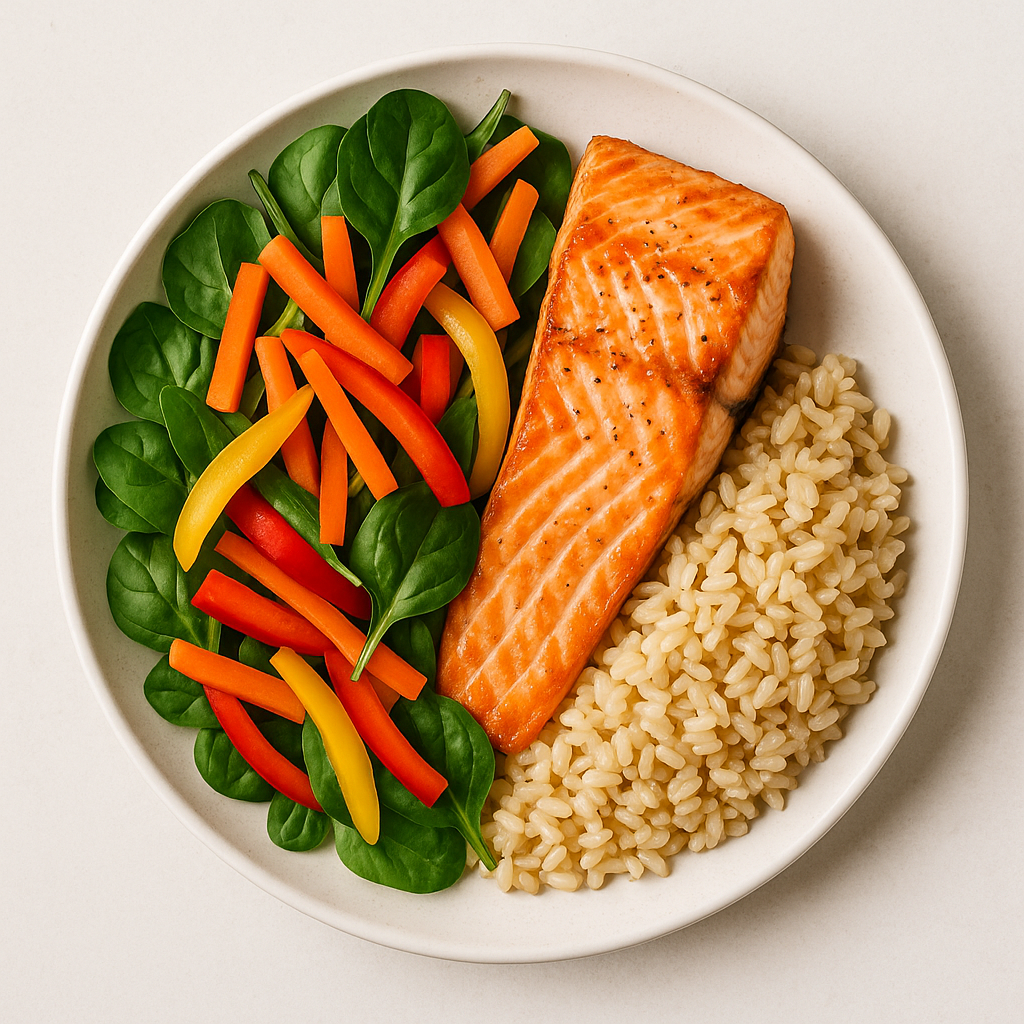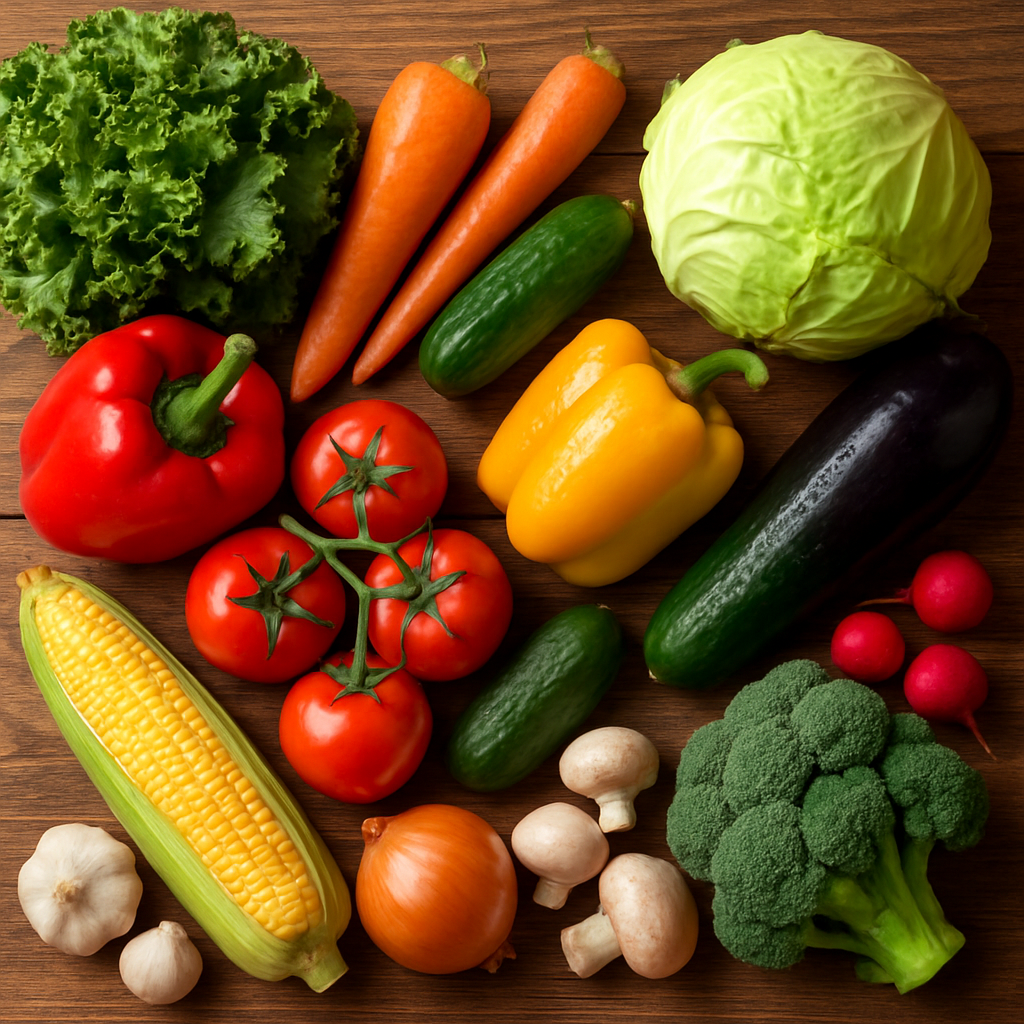Healthy eating principles are not strict rules or temporary diet plans, but long-term habits that help maintain good health, prevent disease and improve overall well-being. The quality of our diet directly affects our energy levels, immune system strength, and even mood and mental performance. Although there is a lot of information about healthy eating, it is often difficult to distinguish what is really important. In this article, we will review eight key principles of healthy eating, based on scientific evidence and expert recommendations. Understanding how a balanced diet strengthens your immunity will make it easier for you to apply these principles in your daily life and achieve tangible results.
In this article, you will learn how to put healthy eating principles into practice, learn to recognize valuable foods, plan balanced meals and create a sustainable diet that you will not want to give up. We will start with the basics that will help you form a healthy attitude towards food for the long term.
Choose unprocessed, nutrient-rich foods
One of the most important principles of a healthy diet is to choose minimally processed foods that are rich in natural vitamins, minerals, and other beneficial substances. Experts from the World Health Organization (WHO) and the Lithuanian University of Health Sciences unanimously agree that unprocessed foods provide the best nutrition for our bodies.
Nutrient-rich foods include:

- vegetables and fruits (especially those of various colors)
- whole grains (oats, rye flour, brown rice)
- lean proteins (lean meat, fish, legumes)
- healthy fats (nuts, avocados, olive oil)
These foods provide not only essential nutrients, but also antioxidants, flavonoids and other bioactive substances that help fight chronic diseases and ensure proper functioning of the body. Studies show that eating more unprocessed foods reduces the risk of heart disease, diabetes and some forms of cancer.
Practical examples of natural foods
The principle of raw food does not necessarily mean complicated dishes. Here are some Lithuanian examples:
- breakfast: oatmeal with berries and flaxseed
- lunch: beetroot soup with beans and buckwheat side dish with stewed vegetables
- dinner: baked fish with fresh salad and buckwheat bread
- snacks: apple with nut butter, carrot sticks with hummus
If it is sometimes difficult to get all the necessary nutrients from food alone, natural food supplements can be a practical solution to supplement your diet, especially in the case of vitamins D or B12, omega-3 fatty acids.
Maintain a balanced diet
A balanced diet means the right balance of nutrients that ensure optimal functioning of the body. The modern food pyramid recommends the following approximate distribution of food groups:
- 45-65% of calories from complex carbohydrates (whole grains, vegetables)
- 10-35% of calories from protein (lean meat, fish, legumes, dairy products)
- 20-35% of calories from healthy fats (vegetable oils, nuts, avocados)
Dietary variety is no less important than proportions. Different products provide unique nutrients – for example, blueberries are famous for their antioxidants, salmon for omega-3 fatty acids, and beans for fiber and plant protein. Lithuanian nutritionists especially emphasize the importance of seasonal and local products – they are not only fresher, but also more ecological, and often more economical.
In practice, the principle of a balanced diet can be implemented by applying the “plate rule” – fill half of the plate with vegetables and fruits, a quarter with high-quality proteins, and the remaining quarter with whole grains.

Apply the 80/20 rule for sustainable change
Healthy eating success lies not in short-term “dietary hikes”, but in sustainable, long-term habits. The 80/20 rule is a pragmatic approach to healthy eating, which allows you to avoid extremes and create a sustainable balance.
This rule means that:
- 80% of the time we eat nutritious, healthy foods
- 20% of the time we allow ourselves to enjoy less nutritious, but pleasurable foods
From a psychological point of view, this is a very important principle – when we completely forbid ourselves from our favorite foods, in the long run we often cannot resist and the “slips” become even more drastic. Studies show that a more flexible approach to nutrition helps to avoid excessive focus on food and the risk of eating disorders.
In practice, the 80/20 rule can be applied in various ways. For example, out of 21 meals a week, 17 are healthy and balanced, and 4 are more relaxed. Or, within the framework of one day, two out of three meals are completely healthy, and one is allowed a little more free interpretation.
This approach helps to combine a healthy diet with the social aspects of life, when you have to attend parties or dinners in restaurants. Flexibility in diet is not a sign of weakness, but a smart decision that ensures the long-term sustainability of a healthy diet.
Let your taste buds adapt – transition to a healthier diet
Our taste buds are not fixed – they can and do adapt to our eating habits. This is one of the most important, but often overlooked, principles of healthy eating. If you are used to sweet or very salty foods, natural products may initially seem tasteless, but over time, the situation changes.
Studies show that taste buds renew themselves approximately every two weeks. After 2-3 months of regularly consuming less sugar, salt and processed foods, most people begin to appreciate natural flavors more and notice more subtle aromas in food.
How to facilitate the adaptation of taste receptors:
- Change your diet gradually – reduce the amount of sugar and salt in small steps
- Experiment with herbs and spices (rosemary, thyme, basil), which give food flavor without additional salt or sugar
- Give yourself at least a month to adapt before drawing conclusions about the taste of new products
- Taste the same product several times – often only after 7-10 attempts do we learn to appreciate a new taste
Dietary doctor Edita Gavelienė notices that her patients who endure the initial adaptation period often later complain that the very sweet or salty products they used to like have become too intense in taste. This is a great sign that the taste receptors have “reprogrammed” and started to appreciate natural flavors.
Learn to cook healthy and tasty dishes
Learning to cook healthy, tasty dishes is one of the essential skills of healthy eating.

Studies show that people who regularly cook at home consume fewer calories, sugar, and processed foods than those who eat out more often.
Healthy cooking doesn’t necessarily require complicated recipes or expensive ingredients. Start with simple dishes with a small number of ingredients:
- a quality scrambled eggs with fresh vegetables
- a stew of vegetables with lentils or chickpeas
- a quick chicken breast or salmon steak with a side dish of vegetables
- a healthier porridge with berries and nuts
Cooking at home allows you to control the ingredients and their quantities. For example, homemade soup can use three times less salt than industrially produced soup, and salad dressing can be reduced in oil and avoid added sugar.
If you’re just starting out in healthy eating, it’s worth investing in a few basic kitchen tools – a quality knife, a non-stick frying pan, and a stew pot. It is also useful to learn how to prepare larger quantities of food at once (meal prep) – this saves time and helps to avoid spontaneous unhealthy snacks.
Interestingly, healthy meals usually have more natural flavors, which can be discovered by experimenting with various herbs and spices. For those who want to improve digestion through diet, it is worth considering special supplements for digestion, especially if you feel discomfort after eating.
Recognize Food Marketing Tricks
In today’s world, food products are often sold with attractive but misleading claims. The ability to recognize food marketing tricks is an essential skill for healthy eating.
Here are some key words and phrases to look at critically:
- “sugar-free” (often means that artificial sweeteners are used instead of sugar)
- “natural” (the term is not strictly regulated and can mean almost anything)
- “organic” (does not necessarily mean that the product is healthy, e.g. organic candy is still candy)
- “low-fat” (often compensated by adding more sugar or salt)
- “with added fiber” (it is better to choose products that naturally contain fiber)
Instead of relying on advertising claims, you should learn to read food labels. The most important information is usually provided in the ingredients list, where the ingredients are listed in order of quantity (from highest to lowest). If the first ingredients are sugar, refined flour or hydrogenated fats, this is a signal that the nutritional value of the product is questionable.
It is also worth paying attention to the nutritional value table, especially the amount of sugar, saturated fat and salt. The State Food and Veterinary Service of the Republic of Lithuania recommends choosing products with less than 5 g of sugar and 1.5 g of salt per 100 g of product.
Practical advice: choose most of your purchases from the perimeter of the store, where fresh food is usually displayed – fruits, vegetables, dairy products, fresh meat and fish. Processed, long-life products are more likely to dominate the middle shelves.
Use food supplements wisely
Although a healthy diet should be the main source of nutrients, sometimes food supplements can fill certain gaps. It is important to understand when they are necessary and when they are excessive or even dangerous.
The most commonly recommended supplements in Lithuanian climate conditions:
- vitamin D – especially in the winter months, when there is a lack of sunlight
- omega-3 fatty acids – if you rarely eat oily fish
- iron – for women with heavy menstruation or vegetarians
- vitamin B12 – for vegans or people with digestive disorders
- calcium – for seniors or people with dairy intolerance
However, before starting to take any supplements, it is recommended to consult a doctor and have blood tests done. This will avoid excessive consumption, which in some cases can be harmful. For example, an overdose of vitamin A or iron can cause serious health problems.
When choosing supplements, it is worth paying attention to the manufacturer’s reputation, certificates and research-based effectiveness. Rimantas Stukas, professor at the Lithuanian University of Health Sciences, emphasizes that high-quality food supplements should be free of artificial dyes, preservatives and other additives.
Finally, do not forget that supplements are called “supplements” for a reason – they are intended to supplement the diet, not replace real food. Even the best vitamins or minerals cannot replace the benefits of fruits, vegetables, and other natural products.
Manage stress for better digestion and well-being
A healthy diet is not limited to what we eat – it is also important how we eat, in what environment and in what state. Stress directly affects digestive processes, food absorption and even our choices of what to eat.
When we are in a state of stress, the body releases stress hormones (cortisol, adrenaline), which:
- direct blood from the digestive system to the muscles
- slow down peristalsis and the movement of food through the digestive tract
- reduce the production of beneficial digestive enzymes
- may cause symptoms of irritable bowel syndrome
- increases cravings for sugar and fatty foods
Interestingly, even when eating the healthiest foods, in a state of constant stress we will not be able to fully benefit from their benefits. That is why the principles of a healthy lifestyle also include stress management techniques.
Practical ways to reduce stress while eating:

- eat mindfully, without smart devices or TV
- breathe deeply for 1-2 minutes before eating
- chew food slowly, at least 15-20 times for each bite
- give enough time to eat – at least 20-30 minutes
- create a pleasant environment – a beautifully laid table, calm music
In addition to these specific eating habits, general stress management through physical activity, meditation, sufficient sleep and social support also has a positive effect on nutrition and digestion. Neuroscientists confirm that regularly practicing stress management techniques improves not only digestion, but also immunity, while reducing cravings for unhealthy snacks.
Conclusions
Healthy eating is not a short-term project or a strict diet – it is a lifestyle based on eight basic principles that allow you to enjoy food and stay healthy. These principles—choosing whole foods, maintaining a balanced diet, applying the 80/20 rule, adapting your taste buds, knowing how to cook healthy meals, recognizing marketing tricks, using supplements wisely, and managing stress—provide a solid foundation for long-term health.
The key is to start with small but sustainable changes. Maybe this week you’ll add more vegetables to your diet, next week you’ll reduce the amount of sugar in your drinks, and the next week you’ll learn a new healthy recipe. Small steps can become big habits over time.
If you want to delve deeper into specific aspects of healthy eating, consider creating a personalized meal plan, consulting with a nutritionist, or starting to explore natural supplements that can supplement your diet with the nutrients you need.
Finally, remember—a healthy diet should not only provide health benefits, but also enjoyment. Find healthy foods that you truly enjoy and turn eating into not just a necessity, but an enjoyable, mindful ritual.
Frequently Asked Questions (FAQ)
What are the main benefits of following the 8 principles of healthy eating?
These principles help prevent disease, maintain a healthy weight, strengthen immunity and ensure long-term well-being.
Do I have to completely avoid “unhealthy” foods to eat healthily?
No. The 80/20 rule allows for all foods to be enjoyed in moderation, which helps maintain sustainability and enjoyment.
Are supplements necessary if I eat a balanced diet?
For most people, a varied diet reduces the need for supplements, but vitamin D (especially during the winter) and some minerals may be recommended depending on individual needs.
How can I ensure that a healthy diet is not too expensive?
Focus on seasonal, local products and cooking at home. Whole grains, legumes, frozen vegetables and smart planning help keep prices affordable.
How does stress affect a healthy diet?
Chronic stress disrupts digestion and promotes poor eating habits; stress management helps ensure the effectiveness of healthy eating choices.

